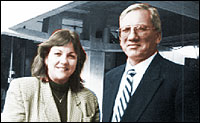|
In one masterstroke that encompasses a new name, a new
location in Doral, and a bold plan for expansion and academic growth,
the Miami Institute of Psychology has just transformed itself into the
Miami campus of Carlos Albizu University.

University President Dr. Salvador Santiago-Negrón with Vice President
Teresa Albizu-Rodriguez, at the portico of the new Doral campus.
The name change took effect on January 1, and was
followed within a matter of weeks by the school's move to a renovated
18 acre campus (formerly occupied by a pharmaceutical laboratory) at
2173 NW 99 Ave.
By this Fall, the newly established university expects
nearly to double its current enrollment of 600 students and to
inaugurate an academic program in elementary education, which will
complement its existing graduate and undergraduate offerings in
psychology and mental health. Business administration studies are also
under consideration.
Carlos Albizu University Chancellor Dr. Jose
Rivera-Berg describes his institution as, "the best kept secret
in advanced psychology education today."
Such a statement might be considered hubris if not for
the fact that its predecessor institution has awarded nearly one out
of five doctorates in psychology in the U.S. earned by Hispanic
students over the past twenty years.
"We graduate more Hispanic psychologists and
mental health professionals than the entire Florida state university
system," added University Vice President Teresa Albizu-Rodriguez,
the youngest daughter of its namesake.
The university's roots can be traced back to 1966 in
San Juan, Puerto Rico--it was then and there that Dr. Carlos Albizu-Miranda
founded the first independent school of psychology in the U.S.
His overriding concern was to offer culturally
sensitive training in psychology to Hispanic students, because his own
doctoral studies, at Purdue, and his subsequent career had convinced
him that "mainstream" psychology practices in the U.S. paid
too little attention to ethnic differences.
Rivera explained, "Psychologists' assessments
have an impact on our patients for the rest of their lives. Unless we
understand what is normal and abnormal in their culture, we increase
the risk of misdiagnosis."
Once Albizu branched out to the mainland in 1980 by
opening the Miami Institute of Psychology in Doral, his founding
vision of culturally relevant mental health training broadened
further. He sought to differentiate treatment methods based not just
on blanket ethnicity, but also based on specific cultural backgrounds.
As Rivera noted, "Hispanic culture isn't uniform.
Puerto Ricans are different from Cubans, Nicaraguans, Colombians and
Mexicans. In South Florida's melting pot, furthermore, we encounter
major Black-American, Haitian, Jewish, and other communities, in
addition to the many varieties of Anglos."
Rivera continued, "What was relevant originally
for psychologists in Puerto Rico proved to be equally so on the
mainland. Today an essential aspect of our school's mission is to
enhance appreciation of others and acceptance of differences; above
all, we seek to promote understanding. We firmly believe there is
beauty in difference and diversity."
By the mid-nineties, the Miami Institute of Psychology
was bursting at the seams and consequently it conducted a search for
new space, which entailed inspecting hundreds of properties over four
years.
In the Spring of 1999, it hit pay dirt and struck a
deal with the Codina Group to purchase its new campus, "for the
value of the land, " according to Albizu-Rodriguez.
The buildings, which date from the late sixties, are
an architectural gem in the international style, designed by the Coral
Gables firm now known as Spillis Candela, and built to "Fort
Knox" construction standards.
They offer far more space than the university needs
for the forseeable future, and they are pre-stressed for vertical
additions. Already the university has made extensive renovations to
67,500 of the 240,000 square feet of interior space, under the
supervision of architects Smith, Reynolds and Hills.
Carlos Albizu University is a "top-down"
institution, with 400 doctoral students, 100 pursuing Masters degrees,
and 100 senior undergraduates (it does not offer freshman and
sophomore years).
|